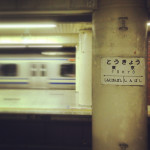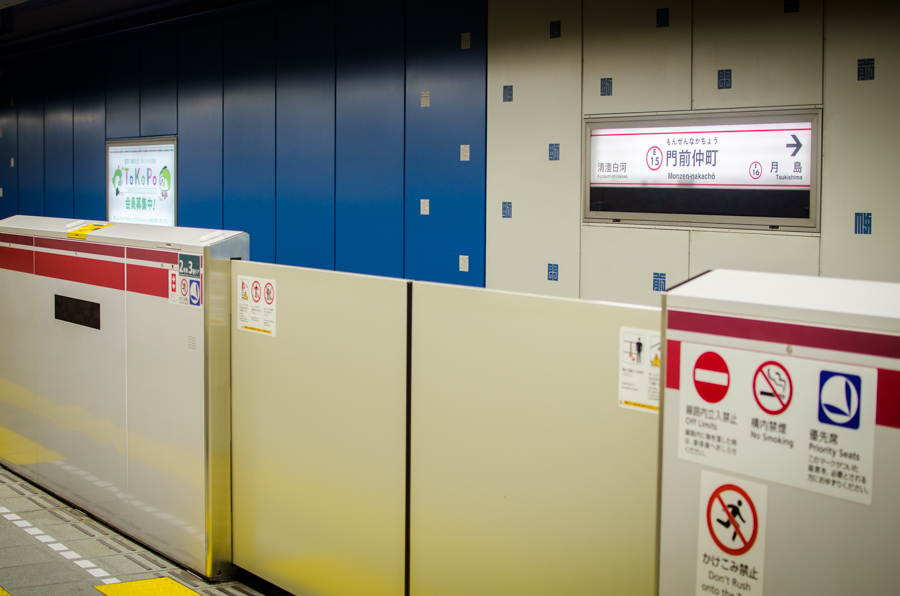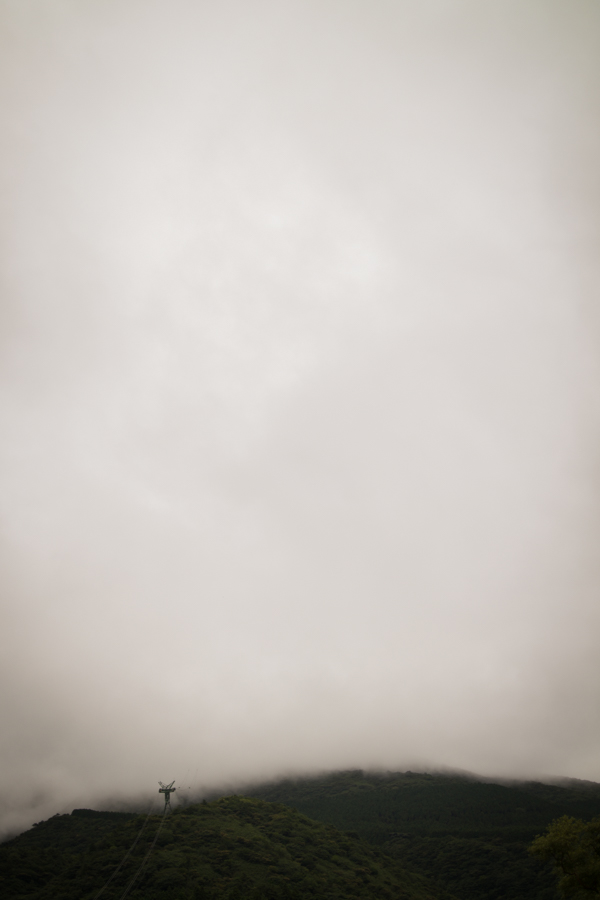
Read about Days 1 and 2 in Japan here, Day 3 here, Day 4 here, Day 5 here, and Night 5 and Day 6 here.
Having only ever traveled as far as Puerto Rico before my trip to the Philippines and Japan, I really thought people were mostly douchey when they talked about travel. You smell that “I’ve been places you haven’t and am therefore better than you are” stink on a lot of people, like they mark places off a map just to say they’ve been there whether or not they carried any meaningful experience away from it. But when I got back from Asia and was like, “DID EVERYONE KNOW I WENT TO JAPAN?”, one of my friends said he read an article about how travel actually changes the way your brain is hard-wired. So it makes sense. I’m sure a lot of people actually are traveling douchebags–see almost any episode of “House Hunters International” involving a young couple, and they’ll tell you they’ve seen the entire world at age 25–but it turns out a lot of people are probably just really excited about what they’ve seen and don’t know how to say it without sounding like a showoff.
So let me start by saying that I really hope I don’t come off like a douchebag but that going to Japan really affected me. I think about it for some reason or another almost daily, whether it’s because I’m craving ramen with shrimp wontons in it, drinking hot-for-8-hours coffee out of the Zojirushi travel mug I bought there, or using my how-did-I-live-my-life-without-this totally-not-expensive bidet Jack installed for me once we got back to NYC. I get this overwhelming feeling of nostalgia every time I see Japanese characters, and I got so addicted to seeing words I didn’t understand on maps. I remember trying to figure out anything on the all-Japanese air-conditioner at our onsen hotel under Mt. Fuji, and I remember what a major moment it was when we realized that one of the characters on the flushing mechanism of the Japanese toilet at our rental for the week meant “big”. As in, flush this way for a little business and this way for a big business. BIG! No wonder we’d been seeing that character everywhere!
I think it’s just the excitement of being completely at the mercy of the place you’re in and hoping for the best. It was just NEAT being the only white people we saw anywhere (more than 98% of Japan is Japanese!). But not speaking Japanese really wasn’t a problem. Sure, we felt the language barrier when we went to the grocery store underneath our building and came home with some butter-like substance for our French bread that was definitely not butter, but I can’t remember actually trying to talk to someone who didn’t know enough English to communicate with us. At the train station, when we were trying to figure out the difference between PASMO and Suica fare cards, a Japanese woman came right over to us out of nowhere to ask if she could help. She sounded so fluent that I started rattling away at her, but it turned out that she just baaaaarely spoke English. But I thought it was so awesome that she had either the confidence to try or just such a desire to be nice that she went for it. And we found that basically everywhere; certainly there were different levels of fluency, but everyone was willing to try and almost seemed pleased to do it. You start to think you could easily live there, but then you realize how long it’d take before you could have meaningful conversations with anyone in Japanese. I probably couldn’t get too far into a political discussion on “hello”, “thank you”, and “excuse me”.
Jack always wanted to ask people if they spoke English in Japanese, which I told him was dumb, because they’d either understand when he asked a question in English because they speak it, or they’d at least catch the “English” and know to ignore him and walk away. But he said he likes to try to speak the language of the people he’s interacting with, and I felt bad about what a gaijin I am but also thought how cool it is that Jack’s totally unembarrassed to try talking to people. I had to force myself even to say “thank you” in Japanese because the rolled R seemed so try-hard to me. But that’s how you speak the language! It sounds normal to them! Stop being embarrassed!

English in the subway!

Gates so you don’t fall onto the tracks!
The subways were a dream in a lot of ways, because all of the signs were in English, the platforms were air-conditioned, no one ever talked on them (the locals and tourists are equally as obnoxious on the train in NYC at 8 a.m. when you just want a little quiet time before work), and there was a special area to use your cellphone in so as to not disturb other passengers. But despite being people who ride the subway every day back in NYC, it was difficult for us to figure out how to use the train tickets, because there are two separate subway systems that use separate types of tickets. So we bought an all-day pass for the Tokyo Metro one day, not realizing that it wouldn’t get us to the subway station closest to our apartment. And when you’re transferring from one system to the other, you have to flip the small ticket from the one system upside down and insert it into the turnstile at the same time as the big ticket from the other system. And you have to insert your ticket into the turnstile when entering the system and also when exiting, so if you forget to have it ready, you’re the asshole at Shinjuku Station holding up the entire exit line. So many subway station employees had to help us. But the system itself makes a lot of senses, and the signage is amazing in some respects. They have each exit labeled as A1, A2, etc., so if you know you entered at A3 because it’s closest to your apartment, you can look for the A3 exit when you’re coming back.
But we had our mobile wifi hotspot, so we kind of just exited wherever we wanted, all devil-may-care. But we realized how reliant we were on it when we got almost to the train station on our way to our fancy dinner on our last night there and realized we’d forgotten it. We considered just getting off at the station near the restaurant and trying to beg for help, but we got too scared, and Nik ran back to the apartment to get it. We then had to take a cab to keep from being late and still got there 15 minutes after our reservation because the place was so hard to find that our cab driver couldn’t get us there even with the wifi. But then we walked into the restaurant, and all of the people were like, “The Americans! The Americans are here, everyone!” Which is decidedly different than being 15 minutes late for your reservation in NYC, where they’re like, “We gave your table away and also charged your credit card for the meal anyway for inconveniencing us.”
Basically, Tokyo was like NYC but with nice people and everything functioning correctly. Even the construction workers bowed to us when we passed, and a woman on the Narita Express from the airport walking along the aisles with a snack cart saw Jack folding the chips bag that we hadn’t even bought from her and took his trash and offered us wetnaps. We saw one broken escalator in a train station and were like, “Haha, Tokyo, not so perfect, are you?!” And then it turned out that it was just one of those really efficient escalators that only turns on when someone steps onto it. Plus, you can get drunk in their parks!
People told us we got really lucky with the weather going in August; it could’ve been really humid and gross, but it was overcast most of the time, so it was cool despite the humidity. And it was just a great vacation because we almost completely played it by ear. We knew we were going to Mt. Fuji, and we knew we wanted to eat a giant burger and a lot of ramen and some conveyor belt sushi and three Michelin stars, but we didn’t have any more of a plan than that. We basically just said, “Let’s go to this one place in Akihabara today,” and then figured out some other things we might want to see in the area. Our lack of plans led us to the fish art exhibit, the technology shrine where businessmen with briefcases came to pray at lunch, and the gorgeous gardens where I took fully half of my vacation pictures. We were so relaxed and so willing to just experience whatever wonder came to us.
Our last day in Japan, the manager of the apartment we were staying in stopped by to see us off. He was a loud, always drunk Australian guy who had married a Japanese woman, and he told us that no matter how long he lived there, he’d probably always feel like an outsider in a culture that had existed for thousands of years before he came to be a part of it. He said that he can learn as much as he can about it, but he’ll always be 75% in the dark. And that’s sort of how we felt leaving Japan, like we could see the bottom of the mountain but the rest of it was still shrouded in fog. Which is great, right? What’s better than loving a country, leaving a country, and knowing you could come back any day and have a thousand more things to see?
